Poverty Stricken Iranians Go To Iraq To Sell Their Kidneys In Dollars
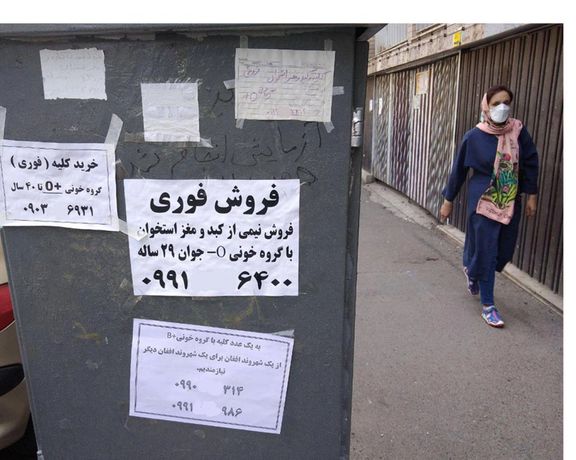
A new report has revealed that many Iranians go to Iraq to sell their kidneys because they can get more money for their organ and in US dollars.

A new report has revealed that many Iranians go to Iraq to sell their kidneys because they can get more money for their organ and in US dollars.
The head of the support group for kidney patients in the western city of Kermanshah, Hossein Biglari, said in an interview on Friday that many people go to the capital Tehran to sell their kidneys because there are brokers there who help them get better prices.
He added that the regulations by the support association of kidney patients forbid buying an organ from people who don’t reside in the same city, therefore the transplant candidates have to forge documents to pretend they live in Tehran.
Such restrictions along with the high exchange rate of the US dollar in Iran have encouraged many people selling their kidneys for money to go to Iraq, he noted.
The official price for a kidney is nearly $3,000 in today’s rates but this is far from the market price for a kidney which is completely arbitrary and can top $10,000 upon agreement between donors and recipients, Biglari said.
Another official from the kidney patients support association of the northern Gilan province, Houshang Rezvanpanah, says the number of people who want to sell their kidneys is increasing due to “poverty and financial problems”.
He said most of the sellers want to use the money to buy a car to work as a driver or have put money down to rent an apartment.

Economic columnist Mohammad Mehdi Hatami in Tehran says Iran's economy cannot be saved even if the 2015 nuclear agreement is revived and sanctions are lifted.
Hatami argued in an analysis published by proreform Fararu website in Tehran that based on official assessments made by the Iranian parliament's research center, the Iranian government has a net debt of 10,000 trillion rials half of which should be paid during the next three years.
At current exchange rates this figure is around $40,000 billion, or more than twice the total annual oil exports at current levels.
According to Hatami, even if Iran makes a deal with the United States and frees its frozen assets abroad and can sell more oil and repatriate its revenues, it must use the petrodollars to pay debts.
Hatami added that although there are promising signals coming from the nuclear talks in Vienna to revive the JCPOA, one cannot take those seriously as long as Iran has many problems in its relations with the international community.
"Let us assume there is an agreement and Iran's assets abroad are freed. What comes next", Hatami asked. The answer is, it depends on many factors, including the extent of Iran's access to those assets, Iran's foreign relations and the balance of power in the region. On the other hand, in the domestic front, the Iranian government is so deeply plunged into debt that petrodollars cannot save its economy.
Iran's foreign debt is less than $10 billion, but its debts to domestic institutions amount to $40 billion. In that sense, Iran owes a lot of money to next generations of Iranians as governments have borrowed from both the Central Bank and the foreign currency and gold reserve that belongs to the coming generations. As an example, next year, the government should pay 1,500 trillion rials of its debts as well as 500 trillion rials of interest on the bonds it has sold to cover its budget deficit.
The Islamic Republic has not been able to generate sufficient economic growth in its more than 40 years of existence. Average growth has barely reached 3 percent. With US sanctions since 2018, it has resorted to two dangerous methods to finance its budget, borrowing from its own banks and printing money. Both have led to a nearly 50 percent inflation.
A report prepared by the previous government (which was denied later by the Planning and Budget Organization) said that the Iranian government will be on the verge of bankruptcy in case there is no agreement in Vienna.
Meanwhile, a more optimistic report published by Iran Diplomacy website, which is close to the Iranian Foreign Ministry, says regardless of the current situation that isolates Iran from international markets and banking systems, the country's economy is still relatively resilient.
The website's over-optimism portrayed an outlook in which Iran's "Looking East" policy and its partnership with China, Russia and Iran's neighbors in Central Asia has made Tehran capable of making its "Jihadist Economy" work.
The author, Ardavan Amir Aslani warned that if Iran fails to end its isolation, within a few years, Tehran will be in a situation that its economy cannot be saved by any reformist or conservative government.

When Meitham, a prospective PhD student wrote to a faculty member of North Carolina University to enquire about joining his PhD program, he never thought he would be accused of just seeking money.
"I don't evaluate emails. I don't evaluate any unsolicited materials. I am not interested in your CV or your email," the response from faculty member William Rasdorf read. He then suggested that Meitham should apply if he was interested in the program. But then said those who send emails and attachments to professors only seek money. "I do not wish to have such students working with me," he added.
Meitham published an image of the response on Twitter. Over 2,000 liked the tweet and nearly 150 replied to it. Everyone sounded astonished by the rudeness of the response and the allegation that those who email faculty members are not serious and "only seek money".
Some twitterati advised Meitham to apply to the university while others told him he should take up the matter with the university's dean and demand an apology. Some took direct action and protested to the incident in their tweets to the university's official Twitter account.
In response to an email enquiry by Iran International, Professor Morton Barlaz, the head of the department of civil, construction, and environmental engineering, said the university regretted the message conveyed to Meitham and were addressing the matter internally.
"It is not reflective of NC State's attitude toward international graduate students, who are a vital part of our teaching and research programs. We have successful graduate students from all over the world. We've apologized to him and encouraged him to apply," he wrote.
But many other university officials did not respond to Iran International emails and questions, including the spokesperson of the university and the Vice Provost for equity and diversity.
Sending “expression of interest” emails prior to submitting a full graduate studies application is quite common as many students find it unaffordable to pay the $85 fee for every application, particularly those living in the developing world.
For Iranian students the payment of application fees is practically impossible, even if they can afford it, due to US sanctions that have cut off Iran's banking relations with the rest of the world.
"Does the NC State professor know about the cost of applying? $85 is unaffordable for most students of the global south if they have to submit multiple full applications. Why should universities charge such fees while bragging about equity, inclusivity, diversity ...?" Kaveh Madani, research professor at City College of New York and the former deputy head of Iran's department of environment tweeted about the incident.
Madani also pointed out that many like him wrote emails and sent CVs when they applied to graduate school. "We also admitted many grad students who wrote emails to us,"he said in a tweet. Madani urged the university to look into the matter and when the official Twitter account of the university responded to Meitham's tweet and said the situation was being addressed internally and it was a "responsible action".
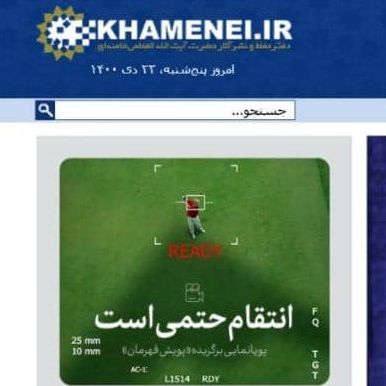
US Senator Lindsey Graham has slammed an animated video posted by Iran’s Supreme Leader Ali Khamenei showing an attack on former US President Donald Trump.
Graham tweeted Thursday, hours after Khamenei put the video on his official website, “In case you were wondering who we are dealing with when it comes to the Iranian – this video says all you need to know.”
The animation shows an all-terrain vehicle with an operator on board driving through a golf course and approaching a point from where its camera shows a man who looks like Trump playing golf. The operator targets the figure and a large gun on top of the vehicle aims at the target and the video ends.
US National Security Advisor Jake Sullivan warned Iran on Sunday not to carry out threats to harm any Americans, after Tehran intensified calls for revenge on the second anniversary of Qasem Soleimani’s death.
Islamic Republic leaders have been issuing threats to take revenge from American and Israeli officials who they believe were involved in planning and carrying out Soleimani’s killing by a US drone strike in Baghdad in January 2020. Trump who authorized the killing is at the top of the Iranian list.
More than 100 Republican Congressmen have written to the Biden Administration to stop nuclear talks with Iran.
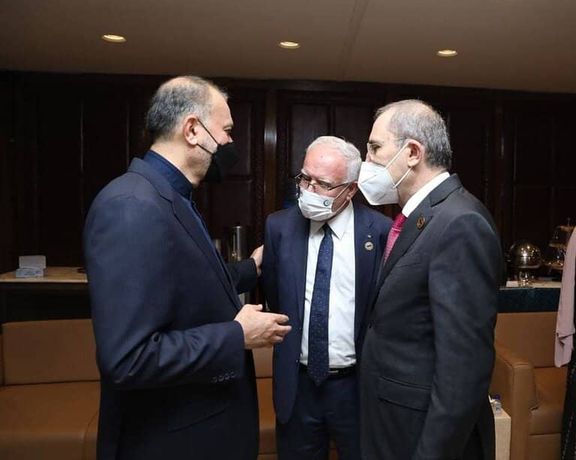
Jordan's Foreign Minister Ayman Safadi says all Arab countries want amicable relations with Iran, but that requires Tehran to change its regional policies.
Addressing a webinar held by Brookings Institute's Center for Middle East Policy on Thursday, Safadi said in addition to Iran's nuclear program, "there are other issues that need to be addressed in order for us to be able to have good relations with Iran."
"All Arab countries want good, neighborly relations with Iran, and there are already so many conflicts and crises in region that they cannot afford a new one," he noted.
However, he added, "in order for that to happen, Iran needs to stop its interventionist policies in the region."
According to Safadi, "healthy relations need respect for non-intervention in other countries' affairs. Iran's policies in the region need to be addressed, and the way to achieve that is dialogue."
He referred to recent talks between Iran and Arab countries as an example of such approach, adding, "We have seen a lot of Arab countries engaging in dialog with Iran with the purpose of making sure
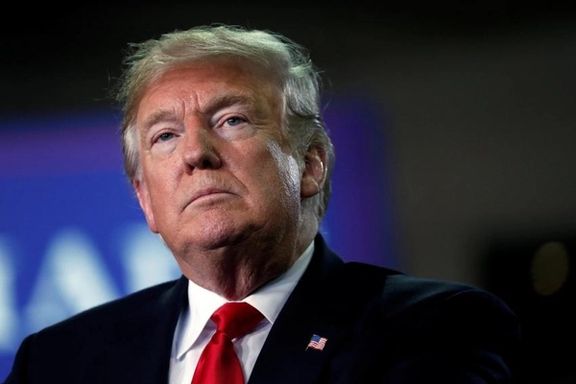
The official website of Iran’s Supreme Leader Ali Khamanei posted an animation video showing the assassination of former President Donald Trump on a golf course.
The animation shows an all-terrain vehicle with an operator on board driving through streets and a golf course and approaching a point from where its camera shows a man who looks like Trump playing golf. The operator targets the figure and a large gun on top of the vehicle aims at the target and the video ends.
At the time of this publication the website was showing “error” and not responding to page requests but the video was still there.
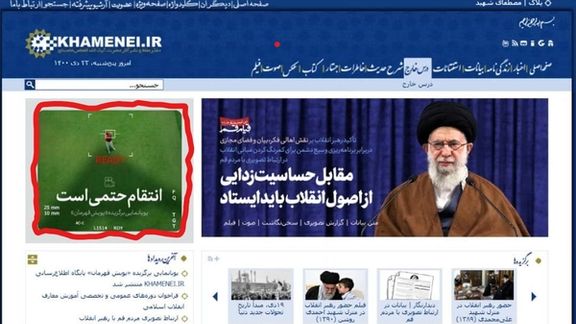
Khamenei and other top civilian and military leaders have threatened revenge for the killing of Qasem Soleimani, the Iranian operator who organized and controlled anti-Western and anti-Israeli militant groups in the Middle East. Trump ordered his killing in early 2020. He was one of Khamenei’s most trusted people.
Khamenei on January 1 lashed out at former US president Donald Trump and others for Soleimani’s killing, saying they “will pay back for their crime.”
US National Security Advisor Jake Sullivan warned Iran on Sunday against harming any Americans, after Tehran intensified calls for revenge on the second anniversary of Soleimani’s death.